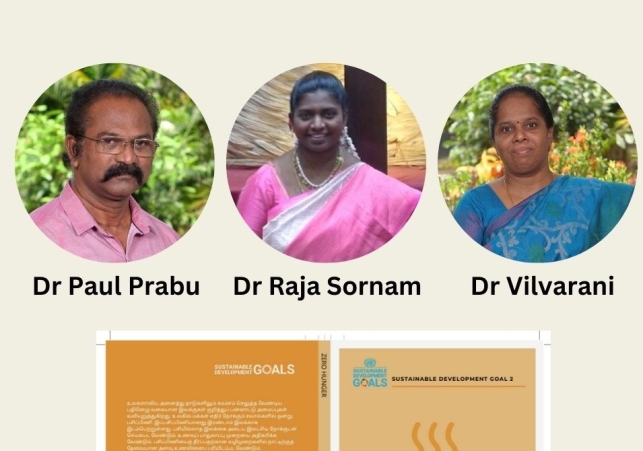

The Sustainable Development Goals (SDGs), established by the United Nations, represent a comprehensive framework of 17 interconnected goals for addressing pressing global challenges and advancing human development in a sustainable manner. Encompassing critical areas such as poverty eradication, quality education, gender equality, and peace and justice, the goals serve as a roadmap for collective action, mobilizing governments, businesses, civil society, and individuals worldwide to work together towards achieving a more prosperous and equitable world by 2030. The initiative spearheaded by the Deanery, Research and Development, Madras Christian College entails the publication of 17 books, with each dedicated to a specific SDG theme. As the SDG goals are inherently interconnected, this initiative aims to cultivate an interdisciplinary research culture at MCC that transcends disciplinary boundaries, recognizing the inherent synergy between various academic disciplines. By encouraging collaboration among faculties, research scholars, and students from diverse departments as authors and editors, this inclusive approach not only enhances the substance of the books but also embodies the ethos of interdisciplinary cooperation essential for effectively addressing complex global challenges. The Deanery envisions this initiative as a catalyst for fostering an interdisciplinary research culture within the institution, promoting cross-disciplinary collaboration and acknowledging the inherent connections between different academic fields.
The second book addresses SDG 2 - Zero Hunger. Zero Hunger is a Sustainable Development Goal that underscores the critical importance of eradicating hunger and achieving food security for all. It acknowledges that hunger is not solely a result of food scarcity but also stems from issues such as poverty, inequality, and inadequate access to nutritious food. Achieving this goal involves implementing strategies to ensure access to sufficient, safe, and nutritious food for everyone. By promoting sustainable agriculture, investing in rural development, and improving food distribution systems, societies can work towards eliminating hunger and fostering sustainable food systems. The publication is edited by Dr. Y. Paul Prabu Santharaj, Dr. J. Raja Sornam, and Dr. V. Vilvarani, who bring their expertise to explore innovative approaches and interventions for achieving Zero Hunger globally. Their collective efforts highlight the importance of interdisciplinary collaboration and holistic strategies in addressing this critical global challenge comprehensively under SDG 2.
A world without hunger emphasizes seventeen types of goals that all countries around the world should be focused on. One of the challenges faced by people in the world is hunger. The United Nations has set a goal to end hunger by 2030. This class has been included as a secondary target. To achieve the goal of not being hungry, you have to work with idealism. The food security system should be enhanced. Some of the measures to address hunger include providing adequate food to the country. Foods change all over the world, but eating and attitudes toward eating do not. It is necessary to insist that everyone has access to food. We want to create a world without hunger in the future. This book contains ten research papers on appetite. During the Sangam period, it elaborates on the concepts of physical health, eating habits, food security, and the problems faced by the countries of the world to create a world without hunger.
Link to Purchase the Book-